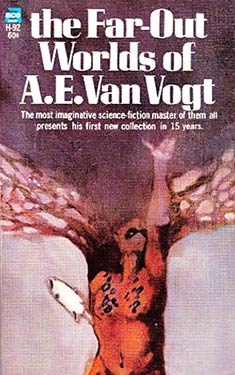A.E. Van Vogt
Completed 5/25/2015, Reviewed 5/30/2015
3 stars
As I say at the beginning of all my short story collection readings,
I don’t really know how to review them.
There’s usually stories I like, some I don’t, so I just give a summary
of a few I liked and try to elaborate on them.
This collection is no different.
I’ve never read any Van Vogt before though he’s one of the Grand Masters
of SF, as awarded by the Science Fiction and Fantasy Writers of America. It seems like the short
story is the best medium for lot of the writers from the golden age of SF. So when I found this collection at a used
bookstore on the coast, I thought I’d give him a try. And like most golden age writers, I found it
pretty good.
My favorite story was “The Purpose”. Virginia
is a journalist who happens upon the Futurian Scientific Laboratories: Neurological and Organicological
Research. Finding that nobody seems to
know anything about this storefront in her town, she decides to investigate. Soon she disappears with a woman who walks
through walls. Upon realizing she’s
missing, her distraught husband begins investigating the company himself,
finding a horrific organ transplant conspiracy that’s intent on taking over the
world. When it was written, organ
transplants were still science fiction, although they were probably on the
horizon. Van Vogt took the concept and
ran in fascinating directions with it, bridging the fiction gap in a
suspenseful way. It’s like a variation
on the college student spends spring break in a foreign country and after a
night of raucous behavior, wakes to find himself missing a kidney. I also liked the fact that though it was
written in 1945, the journalist and her abductor are women. Though they’re not exactly the main
characters, they have a pretty large part in the story and aren’t simply
stereotypically portrayed.
“Ship of Darkness” is an odd time-travelling tale of a man
who comes upon what seems to be the human race evolved to 3 million A.D. At first he’s confounded by the people, but
slowly works into trying to communicate with them. Then there’s a great twist at the end. The story was a little tough to read, but
that was best part of it, seeing these people, trying to figure out who they
were, what they were doing, and how to communicate with them. The prose is not great, but where he goes
with it is very interesting. It read a
little like Arthur C. Clarke: gazing in wonder at some scientific marvel and
then trying to do something with it.
Two other stories really stood out with their similar
themes. “The Replicators” is a wonderful
exploration of xenophobia through an alien encounter. It’s been done numerous times, but it grabbed
me with the revelation of the purpose of the alien’s visit. “The First Martian” explores racism in the
workplace when the whites-dominated train and mining industry on Mars begins
bringing in Andean natives to work without spacesuits in the thin Martian
atmosphere. So yeah, the science is
dated, but the message is great and pretty well executed.
Though I liked these stories, none were really
outstanding. That’s been my experience
with a lot of the golden age authors. I
think what makes them stand out is simply that they were writing about scientific
wonders prolifically. Some of the better
ones like Van Vogt were commenting or at least reflecting on the problems of
their times within the fantastical worlds they created. Unfortunately, I think I’ll always compare
these writers to Ray Bradbury, who will probably always be my favorite golden
age short story writer. I think it will
almost always be difficult to read sixty to seventy year old SF work because
the genre has evolved beyond the “Amazing Story”. But I‘ll continue to read the classic authors
to experience the foundation from which our current body of work evolved. I give this three out of five stars, but I
prefer to think of it as another good sojourn into the history of my favorite
genre.

No comments:
Post a Comment